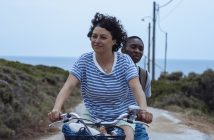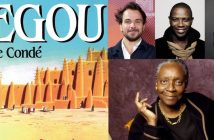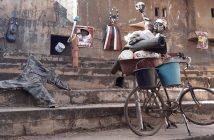Jean-Marie Mollo Olinga: Why make such a serious film for a first feature?
I’ve always worked in urgency. And when a topic comes to me I can’t find peace of mind until I put it into images. I did not choose the topic according to its seriousness for my first feature film. I had to make that film. I was aware of the chances I was taking because it was a difficult film to make in terms of approach and artistic choice. The war in Yugoslavia triggered the story. The monstrous images showed on TV, the testimonies of raped Yugoslavian women who had acid poured in vaginas were unbearable for me. I wondered why such atrocities, how did we come to that? Then, there was the Rwandan genocide and I wondered how someone could kill his neighbor, his neighbor’s wife who may have breastfed them when their mothers were in the fields, because in Africa it’s often like that: when a baby cries and his/her mother is not around, any woman with milk in her breast feeds the baby. Then there was Sierra Leone, Liberia, and Ivory Coast. Then I thought about my uncle, whom I loved, he was burnt alive one night in a camp, like a lamb on a barbecue. The way they killed him has always shocked me. They could have covered his eyes and shot him in the back, as you see in war films. He was in the service, I would have understood. I didn’t want to tell my uncle’s story, but rather the atrocity of his death which continued to trouble me. All of this brought us, my co-scriptwriter and me, to reflect on atrocity, not on war. I could almost understand war even justify it, but not genocide.
JMMO: Is « The night of truth » a cry of anger, or rather a peace message?
Both, I guess. But it’s more a reflection in order to humanize human beings. In our reflection, a conclusion imposed itself: in every human being, there is an animal side and a human one. And if such atrocities have happened, it’s because the animal side has won over. We thus started to build our story on this, hoping that those who listen to the story and adhere to it will simply ask themselves: what about my own duality? Did I let my animal side take over my human side, or the contrary? But lately, I realized that the basis of this conclusion was wrong. Animals do not eat one another within the same community. They hunt, they’re more aggressive, more brutal towards other animals, but not with their peers. Maybe we should learn to be animals instead.
I do not have any magic formula or any political plan to bring back world peace, but I really think it is important that each one of us should examine our own consciences.
JMMO: What difficulties did you come across when directing the actors? I’m thinking about the president, the president’s wife, the colonel in particular.
I had a few difficulties when directing the actors for three reasons: the main reason was that most of my actors were not professional actors and were playing in a film for the first time. The servicemen are real servicemen. Colonel Théo is a Burkinabe army commander as are Captains N’Gové and Youba. Edna (Naky Sy Savané), Soumari (Georgette Paré) and Tomoto (Rasmané Ouédraogo) are professional actors. The second reason was the language choice: French. My actors were more credible when talking in their own language than in French. But choosing French was a script choice because a common language was needed and it was French, as in many French-speaking African countries. There was also the desire to satirize some characters like the President, who is a combination of several African presidents like Bongo, Kerekou, and other « dinosaurs » of the political world.
Olivier Barlet: It is a night of freeing speech; but what truth is it about?
The intrinsic truth, the inner truth, the individual truth. It’s not the notion of truth in the widest sense. But at which moment do we stop thinking we are a representation? At the moment you undress yourself in front of a mirror for the first time. You cannot cheat anymore. I wanted to talk about that truth. A wise man said one day: « the truth is an agony that does not end. The truth of this world is death. »
OB: Violence raises the question of its representation. I really liked its evocation in the film. Was it better to show it or to evoke it only?
It was clear to us that violence and cruelty shouldn’t be shown complacently, but incorporated in a dramatic progression like an initiatory journey where the viewer will meet his / her own demons and will learn (that’s what I hope) to conquer them. I could not address atrocity without showing it, but it was absolutely out of the question to remake those television news, reports, photos, etc. How to represent it? Through frescos, tales (very important in the African tradition), dreams, visions and also through the barbecue scene which is a faithful reconstruction of my uncle’s death. It was important for me to show this violence in all its forms.
OB: The film insists on ritualization. You seem to say that despite the reconciliation orchestrated in the public sphere, something in the domain of the individuals’ interior selves is needed.
Exactly, the official sphere is not enough. The big speech about reconciliation is an abstract notion, beautiful but abstract, hardly feasible when one has undergone atrocities or suffered in the flesh. As long as people did not solve their own issues, they cannot find a solution. There’s no way round it. I was greatly inspired by mourning and mourning in Africa especially. You’re very supported in the first days. And you get the impression you accept the loss of a dear one better. But when everyone goes away, you sink into a terrible pain. When I lost my father, I had trouble mourning for him. I cried crocodile tears just to show everybody that I treasured my father and that I was sad. But when everybody left I really started mourning and it lasted two years. Every day, from midnight to three in the morning, I cried over my father’s death, and I could see him, sometimes in pain, sometimes in joy. I had to go through that to accept his absence and to replace sorrow with happy memories. Now, I’m not sad anymore because I have accepted his virtual presence everyday next to me.
OB: But in the film, a woman takes revenge to solve her problem.
Yes, because people tackle their problems in different ways. To get over tragic situations people need to hang on to something. Edna, to live, needs the truth about the circumstances of her son’s death. It’s the only reason why she decides to go to the party given by her son’s executers. Once the desire is accomplished, the idea of revenge surfaces which is only natural. And the truth becomes unbearable because the pain is even more acute. The desire for revenge stronger. Edna is a paradoxical character, both monstrous and deeply human. A bit like the sadly famous « General Mosquito » who said: « I promised myself to do something to make the country change » and who eventually cut off children’s arms (« Long sleeves or short sleeves? ») or again the « Naked General » who, after having slaughtered many people, suddenly converted and started to preach the Gospel at crossroads, naked
Edna, like Théo, goes right to the bitter end. I think that, at some point, one has to reach an ultimate sacrifice, a bit like Christ.
OB: One must lose a part of oneself?
Yes. One cannot try to save one’s skin entirely.
JMMO: Why kill her? Is it a way of condemning her?
Her death, like Théo’s, is a sacrifice in the hope of peace. And this sacrifice is necessary. It seems to me that apart from conferences, tribunals, peace treaties etc., one must achieve an ultimate sacrifice. Which one? I don’t know. But it’s compulsory.
OB: It greatly struck me to see how you follow the pattern of classical tragedy: this need for death to go further. Is this your inspiration?
Yes. We were inspired by some of Shakespeare’s tragedies. And also, of course, by Christ’s message because I’m fundamentally a Christian. Friends of mine who had read the screenplay told me that it reminded them of Hamlet, Macbeth. These texts confirmed the writing choice. With my co-scriptwriter, we wanted to write a story that was as tumultuous and as violent as a Shakespeare play, to reinforce its intensity by applying the rules of classical tragedy: unity of time, unity of place, unity of action.
OB: Isn’t the colonel a fundamentally Christian character? One gets the impression that he signifies that Man is good and that he can gain a hindsight on the actions he commits
God created Man good and Man turned away from God. I’ve always been struck by the stories of those who survived the genocide in Rwanda. Despite the worst atrocities they might have suffered, they have remained fundamentally Christian. When listening to them or reading them, I feel like they have the Bible in their hands and that they draw from it what helps them to get on with their lives. Théo was probably possessed by the devil when he committed these atrocities. God is good and he creates Man in his own image, but Man is free and he can experience evil.
OB: Do people who commit such atrocities really regret what they have done?
I’m not sure they’re not tormented with guilt. I’m sure they boast about their deeds to look tough and important. But do they sleep at night? I watched André Van Inn’s film on reconciliation in South Africa and saw these people telling how they committed atrocities and I understood that an act is never gratuitous. Atrocities are often committed to sublimate the soul an instant, in this desire to be superior, to be equal to God. But when the deed is over, when they look at what they’ve done, I’m sure they have a feeling of regret and disgust.
OB: Tomoto is the man of the people. He does not think about regret. His reactions are visceral but in the meantime, he quickly adapts.
He is fatalist. Many people, I think, will relate to this character. He triggers situations because he’s not a believer. In that type of situation, the population often becomes tetanized and fatalist. That’s why I put that take at the end of the film showing a freed sheep running everywhere. It’s exactly that. At some point, we’re sheep. Maybe because we’re powerless, we let ourselves be guided, manipulated, oriented.
OB: The film ends on a dictation, a kind of historical conclusion on the black world’s destiny. Was it the desire to understand genocides in Africa as the product of History?
I do not want to limit them to Africa. The events show that it is a universal reality. Everywhere in the world, with no education, you’re nothing. If you don’t know where you’re from, you can’t go toward something positive. We must teach this to our children, show them what was monstrous, what they must refuse to do, what undertakings need to be banned, if you don’t know what pain is, you can’t avoid it. We need to know what happened. Otherwise, we’re doomed to repeat it over and over again.








